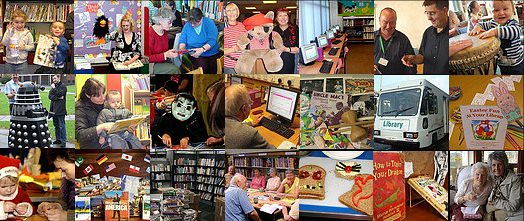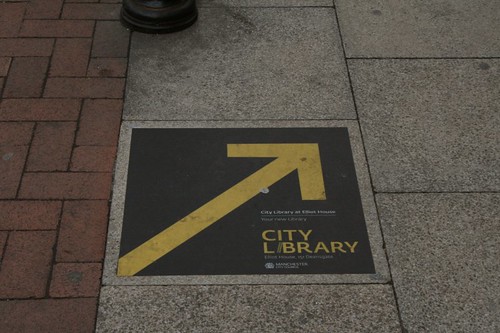We have good people working in our libraries, should we choose to use them. Not a day goes by without something really good happening for somebody in one, other or all of our libraries. There are things we can do better, to be sure, we're only human after all, but we mustn't ignore the good that we do. If we don't value that good, why should anybody else?
Most of our customers think that we are A Good Thing. This is a double-edged sword: are we really that good or are we just delighting the few at the expense of the many? Well... Place Surveys tell us that we are by far the most popular of the council's services. When you look at the overall results this is damning with faint praise but we must be doing something right even so, otherwise we wouldn't even be that popular. We know we have to change with the times and the different needs of different customers. In doing so we need to be careful to know which is baby and which is bathwater. Let's make sure that we recognise what we're doing right, learn from it and keep on doing it at least as well, if not better.
If the services we're providing are all that good (and they very often are), why do we keep it a secret? If it's worth doing it's worth letting people know that you can do it, do do it and could do it again. That isn't just publicising events and activities before the day, though that's important too. We need to make sure that once the job's done it isn't consigned to oblivion. It isn't done and dusted when the chairs are put away, there's work to be done.
Review the event. How did it go? Were the results as planned? Was the actual audience the intended audience? If not, what went right/wrong? What do you learn from the event? What can somebody else learn from the event? How? (Why re-invent the wheel?) Share the experience.
Share the news. Tell people it's happening. Tell people it happened. You did something. We do lots of somethings in libraries. How many people really know that? (Here's a clue, at a recent meeting of Chief Leisure Officers in one of the English regions the question "what do libraries do these days?" wasn't rhetorical).
Celebrate the event. We're crap at this. We need to be better.
Be realistic. We seem to think that if we don't get a football crowd turning up at the library it's a failure. Elsewhere in the world around us there are people doing events once, twice a year that were attended by a dozen people or so and feted as major achievements. Once or twice a year. We're doing that every other week in our libraries and accepting the label "declining." Footfall and visitor counts are important measures but tell but a fraction of the story. Having a load of stray bodies in the library for an event isn't necessarily a sustainable option. If those people have a miserable time of it because the venue was cramped or overcrowded or they are otherwise not delighted then that's worse than not having them visit in the first place: "the potential customer" becomes "the doesn't fancy come back here again." Delivering something brilliant for a sufficiency of visitors who want to come back to the library even when there's not an event going on is a result. Over a year twelve repeat customers visiting once a month is a better return than one hundred coming to the event and not coming back. The event is the hook to draw in the potential customers. Once they're in the library it's our job to persuade them to come back even when they're not an event going on. There's more chance of doing that when we're interacting with customers rather than just controlling crowds.
Tell the world. I've repeated myself. So should you. You had the event. it was a success (it was a great success). Let the world and his dog know it was a great success.
We do services as well as events. What applies to events applies to services. We're doing lots of really neat stuff on a day-to-day basis. So tell the world about this, too.
Did I say tell the world?
Telling the world isn't about just slapping a photo and a bit of copy somewhere and waiting for the world to find it. Any more than marketing an event is just putting a notice up in the library.
Here's why not if you don't believe me.
Photos are good. A picture tells a thousand words. Summed up as "libraries do neat stuff."

We need to make sure that people bump into photos of people enjoying themselves in the library. And keep bumping into pictures of people enjoying themselves in the library in odd places that might not be "library" places. Picture of people enjoying themselves in the library? Perhaps the library is an enjoyable place to visit? Perhaps they'll come and visit the library to see what other neat stuff we do.
And we'll tell them.
And we'll tell them to tell their friends.
And we'll tell them about the neat stuff going on in our other libraries. And they can tell their friends that, too.
The important, the most important, thing is that we cannot assume that people will know what we do. And we cannot afford for the off-chance that they pop in to find out. There is no place for assumption and blind hope in a time of uncertainty. We need to tell people what we do. And keep on telling them.
If we wait to be asked they might not come and ask us. And they might just assume that we just stand around waiting to stamp out a few books, in between going "shhh!!!"
 Every so often we unearth undiscovered riches.
Every so often we unearth undiscovered riches. I'm just starting taking photographs of them (there aren't many smaller than A3 sized so in-house scanning's not an option for us). I'm putting them onto the Library Service's Flickr account in a set I'm calling "Discovered Treasures." (The ones I've put on so far haven't been digitally remastered so look a bit murky. I'll be putting "before" and "after" versions online eventually.)
I'm just starting taking photographs of them (there aren't many smaller than A3 sized so in-house scanning's not an option for us). I'm putting them onto the Library Service's Flickr account in a set I'm calling "Discovered Treasures." (The ones I've put on so far haven't been digitally remastered so look a bit murky. I'll be putting "before" and "after" versions online eventually.)



